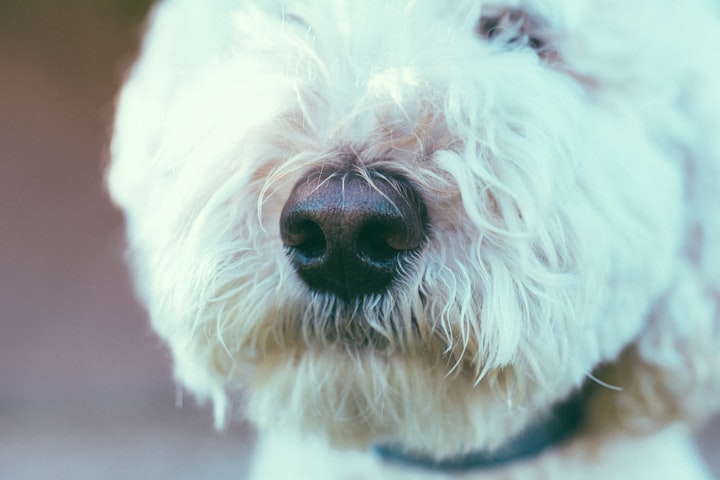
I remember there were dogs in my grandma's house. One of them was a small Peking dog, which barked loudly. Her name was “豆豆” (Small Beans), which I then found out was the mother of the other three big ones.
The next time I came back to visit my grandma, I saw her bark at me when I came close to the door and crawled towards me with her nose on the floor. She sniffed my shoes, shook her tail happily in recognition. I brushed her hair, and she ran away. It was nothing strange, but then I found out…
Small Beans had one eye blinded. She lost her eye in a fight with dogs from another place. And the remaining one was injured, with limited eye-sight. Then how did she know I was there, and still remember me?
Because dogs ‘see’ the world through their noses.

Covid Dog Detectives?
Humans have taken advantage of dogs’ excellent sense of smell for decades. Dogs have a powerful sense of smell; they possess up to 300 million olfactory receptors in their noses, compared to about six million in us. That is why their nose can smell more than what we see and smell together.
So here comes the good news.
Researchers are trying to test whether they can detect saliva samples from COVID-19-infected patients in a recent study. The results are positive. The trained sniffer dogs can distinguish randomized samples, both positive and negative, with an overall detection rate of 94%.
Soon we will see airport security personnel standing alongside a Covid detective. That would help us spot the infected person within seconds and prevent wide infections of Covid, or even better, another acute pandemic.
King of Smell
It is not so surprising as sniffer dogs are already familiar animals in airports and cargo stations where they help humans do the dangerous job of detecting firearms, drugs, and explosives. But without too much attention, scientists are already exploring the possibility of using dogs to detect disease.
In 2018, British entomologist Steve Lindsay studied malaria at Durham University in the U.K. reported that dogs could sniff malaria. One year later, in 2019, scientists have also reported trained dogs can detect some cancers.
We cannot truly know what the dog smells from cancer, as we do not have the same senses. But researchers believed that patients who got cancers carried a signature scent that canines can detect. On the other hand, dogs can detect micro-organisms living inside the blood of patients carrying malaria as those little creatures produce a specific “scent.”
The Experiments
Scientists in different countries turned sniff dogs' experiments to COVID-19 early in the pandemic. They have trained their dogs to smell samples, most often of sweat, and to sit or paw the floor when they detect signs of a positive infection.
Trials at airports in the United Arab Emirates, Lebanon, and Finland, are using dogs to detect COVID-19 in sweat samples from passengers in the airport. The tests are then cross-checked with conventional lab tests.
According to a French-Lebanese research team:
The animals can detect Covid-19 in almost 100% of cases, after smelling human sweat. Now they are training 20 dogs belonging to Lebanon's security forces to screen arrivals at Beirut airport.
You can see the dogs in actions here: Covid-sniffing dogs deployed at Helsinki airport
One point that needed to be emphasized is the detection results from dogs had identified cases days before conventional tests picked up the virus, inferring that COVID-19 sniffing dogs can spot infection before symptoms start.
We have Vaccines coming; why do we need sniff screening?
Now we have the schedule of effective vaccinations coming, will the Covid sniffing dogs be redundant before they get to work in public? The short answer is No.
As you may know, vaccinations will take months to get to a large population. There are regions that will not have access to vaccinations for years.
More importantly, we still do not know how long the immunity will last after vaccination (please refer to CDC on the facts about vaccines).
But what we can be sure of is once “this procedure” can be standardized, from what samples should be collected, how to collect samples, to train the dogs to detect them. We can respond better and faster to another “unknown virus attack” next time.
Yes, there will be a “next time.”
Yeah, I know. We all want to go back to “normal” ASAP. I cannot withstand being in the voluntary “house arrest” for another year. However, we all now know the Covid has already undergone gene-shifting several times.
This is what I know better; the virus can change like a computer virus. Thus, infections and vaccinations are like what we encounter on our computers’ antivirus software — signature update and malware.
Most of us would prefer walking by a dog before entering the stadium than watching the game on TV, right? It may not be normal we used to have. But at least we can meet again, have people grouped in airports, sports stadiums, train stations, universities, etc.
Imagine there are teams of trained dogs in a short time ready for work. People in crowded areas like concerts, airports, train stations can line up and walk past the Covid detectives, canines, one by one. Screening for suspected patients would be within seconds.
My Concerns
In Hong Kong, we reported several positive-detection of Covid on dogs. From the Agriculture, Fisheries and Conservation Department (AFCD) test result, Hong Kong, the blood tests from 17 dogs and 8 cats, only 2 dogs had tested positive for the COVID-19 virus.
The finding indicated that dogs and cats are not infected easily with this virus, and there is no evidence that they play a role in the spread of the virus. The dog has shown no symptoms so far, yet, there are still many unknowns.
Although the risk of animals spreading COVID-19 to people is considered very low, It would be better to see more test results on the possibility of Covid infections on dogs before agreeing to train them methodologically.
Where is all this heading?
Dogs can be trained within days to have over 90% accuracy. I know it is not fair to have the dogs sniffing all dogs and work for us on this disgusting career. Meanwhile, scientists are now striving to find the next “sniff detectives.”
Researchers are working on new electronic particle sensors to detect covid particles. Using a robot to sniff the virus would be much more effective and work 7 x 24 as long as there is electricity.
If the particle sensor is a success, someone with a contagious disease can be screened when pressing a button. One day we can have ticket machines for the train that has the covid-sensor embedded, or more aggressively on the elevator button panel.
By doing that, we can have an advancement in virus detection that can detect multiple deadly viruses and bacteria all at once within a second. From that point, we can take back our “normal” life.
Final words
Though, the recent study is only a Proof-of-Concept test. There will be several independent peer reviews before anything is put into practice. The test is still at an early stage; the result is quite promising.
With proper but short training, dogs can become detectives of COVID-19 or another dangerous and viral unknown virus. Dogs' screening diseases could be the proper and faster screening soon, which is way better than what we are doing with tubes and labs today.
Thank you for reading! Happy reading and sniffing.
References:
https://doi.org/10.1093%2Fofid%2Fofy179
http://www.ncbi.nlm.nih.gov/entrez/query.fcgi?cmd=Retrieve&db=PubMed&dopt=Abstract&list_uids=16484712
https://www.lshtm.ac.uk/research/centres-projects-groups/using-dogs-to-detect-covid-19
https://bmcinfectdis.biomedcentral.com/articles/10.1186/s12879-020-05281-3
About the Creator
Z3n Ch4n
Interested in Infosec & Biohacking. Security Consultant. Love reading and running.
hackernoon.com/u/z3nch4n






Comments
There are no comments for this story
Be the first to respond and start the conversation.